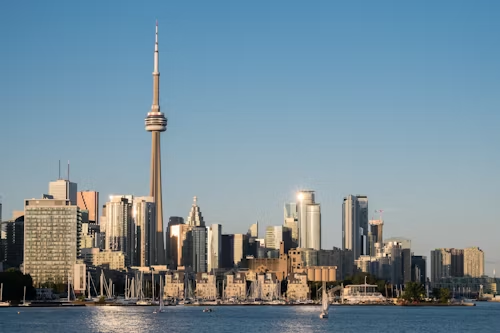
Which Canadian Cities are Most Impacted by the BoC Rate Hikes?
As the Bank of Canada continues to adjust interest rates, the impact is being felt unevenly across the country. This article highlights the Canadian cities where homeowners and buyers are feeling the most pressure — from skyrocketing mortgage payments to stalled housing activity — and explains why some regions are hit harder than others.
Canada’s central bank has been busy trying to tame inflation—but not all cities are feeling the same squeeze. While the Bank of Canada’s rate hikes are designed to slow spending and borrowing across the country, their impact varies dramatically based on where you live. Why? Because the cost of living, housing demand, income levels, and even supply chains look very different in, say, Toronto versus Charlottetown.
And in 2025, as mortgage renewals pile up and inflation proves stubborn, some Canadians are feeling these changes more than others.
📌 Infographic: How BoC Rate Hikes Affect Canadians by Region
Description: A regional breakdown showing how Bank of Canada interest rate hikes impact inflation, housing costs, and mortgage affordability across major cities like Toronto, Vancouver, Halifax, and Charlottetown.
- Use colour-coded Canada map to show inflation sensitivity
- Include icons for housing cost, food, transport, etc.
- Highlight most and least impacted provinces
💡 Suggested placement: Early in the article, just after the intro about uneven BoC impact across cities.
Cities With the Highest Inflation Right Now
According to StatsCan data, cities in Atlantic Canada are topping the inflation charts. Charlottetown, PEI leads the country with an eye-watering inflation rate of 8.7%. Winnipeg follows close behind at 8%, with Halifax not far off at 7.8%.
What’s interesting is that while these cities aren’t the biggest metros in Canada, their costs for essentials like food, utilities, and transportation are climbing fast. And unlike larger cities with broader supply chains, smaller cities tend to feel inflation’s bite more immediately.
📌 Chart: Inflation Rates by City, 2025 Snapshot
Description: A vertical bar chart showing comparative inflation rates in Canadian cities such as Charlottetown, Winnipeg, Halifax, Toronto, Montreal, and Vancouver in 2025.
- Y-axis: Inflation rate (%)
- X-axis: City names (e.g. Charlottetown, Winnipeg, Halifax, etc.)
- Highlight highest (e.g. Charlottetown) and lowest (e.g. Iqaluit) values
💡 Suggested placement: In the “Cities with Highest Inflation in Canada” section of the article.
Why High Inflation + BoC Hikes Hurt More in Certain Cities
Here’s the issue: BoC rate hikes are meant to slow down inflation by making borrowing more expensive. The idea is that if mortgages, loans, and credit become pricier, people will spend less and inflation will cool down.
But that only works in theory.
In practice, Canadians are still spending—because essentials like groceries and housing aren’t really optional. At the checkout counter or when your mortgage renews, the pinch is real. And in cities where incomes haven’t kept pace, the combination of inflation plus rate hikes creates a double blow.
Canada’s Priciest Cities for Housing
It’s no surprise—Vancouver and Toronto still dominate the charts when it comes to home prices. Vancouver’s average sits around $1.4 million, while Toronto hovers close to $1.2 million. Even smaller cities like Victoria and Kelowna are pushing the $1 million mark.
When rates go up, the effect on these markets is massive. Monthly mortgage payments can jump by hundreds—even thousands—of dollars. And that doesn’t just affect new buyers; it hits those renewing mortgages in 2025 especially hard.
📌 Table: Sample Monthly Mortgage Payments at 2.5% vs 5.5% for a $1.2M Home
Assumptions: 20% down payment, 25-year amortization, principal & interest only.
| Mortgage Rate | Loan Amount | Estimated Monthly Payment |
|---|---|---|
| 2.5% | $960,000 | $4,301 |
| 5.5% | $960,000 | $5,887 |
💡 Suggested placement: In the section “How Do Higher Housing Costs Mixed with BoC Rate Hikes Impact Consumers?”
What Happens When High Housing Costs and High Rates Collide?
In markets like Vancouver or Toronto, high mortgage rates are already leading to slower home sales. Some homeowners are forced to list because they can’t afford their new payments. That could eventually lead to a drop in home prices—but don’t expect a sudden crash.
What’s more likely is a slow correction, as affordability pressures build. Even with softer prices, higher rates mean affordability doesn’t improve much—unless incomes rise or borrowing costs fall again.
📉 Line Chart: Home Price Trend vs Mortgage Rates (2021–2025)
This chart will illustrate the relationship between national average home prices and the average 5-year fixed mortgage rate from 2021 through 2025. It should highlight how rising rates since 2022 have influenced housing affordability and price corrections.
- X-axis: Year (2021 to 2025)
- Left Y-axis: Average Home Price (in $CAD)
- Right Y-axis: Average 5-Year Fixed Mortgage Rate (%)
- Data Sources: CREA (Canadian Real Estate Association), Bank of Canada
💡 Suggested placement: In the section “Navigating Bank of Canada Rate Hikes in 2022–2023.”
So, Which Cities Are Most Impacted?
Let’s put it all together:
- Cities with the highest inflation: Charlottetown, Winnipeg, Halifax
- Cities with the highest housing costs: Vancouver, Toronto, Victoria
- Cities with weakest housing affordability + fastest-rising living costs: Toronto, Halifax, Winnipeg
That makes Halifax and Winnipeg some of the most vulnerable mid-sized markets, while Vancouver and Toronto continue to feel long-term affordability strain.
🏙️ BoC Impact Index: Top 5 Cities Most Affected
This visual will rank Canadian cities based on how significantly they’ve been impacted by Bank of Canada rate hikes. The index should factor in:
- 📈 Local inflation rate
- 🏠 Average home prices
- 💳 Consumer debt levels
- 📉 Mortgage delinquency or refinancing pressure
Top 5 Cities (Example):
- Charlottetown, PEI
- Halifax, NS
- Toronto, ON
- Winnipeg, MB
- Whitehorse, YT
📌 Suggested format: Heatmap or bar graph with ranking and brief impact commentary for each city.
A Look Back: 2022–2023 BoC Rate Hikes
Let’s not forget: most of this started when the BoC raised rates aggressively in 2022 and 2023, trying to bring inflation under control after the pandemic.
Some consumers initially paused home purchases, while others rushed to buy before rates jumped further. That behavior created spikes and slowdowns—confusing buyers, sellers, and economists alike.
📊 Timeline: BoC Rate Hikes vs Inflation Response (2022–2025)
This visual will show a chronological comparison between Bank of Canada policy rate decisions and corresponding inflation changes across Canada from 2022 to 2025.
Suggested timeline points to include:
- 🟢 Mar 2022 – First rate hike: +0.25%
- 🟡 Jul 2022 – Inflation peaks near 8%
- 🔴 Oct 2022 – Policy rate hits 3.75%
- 🔁 2023 – Gradual inflation decline, mortgage stress builds
- 🟢 Jan 2024 – BoC signals pause, inflation around 4%
- 🟢 Jun 2024 – First rate cut amid economic slowdown
- 🔵 Mid 2025 – Inflation stabilizes near 2.5%, rates at 4%
📌 Format suggestion: Dual-axis line chart with inflation on one axis and BoC rate on the other.
FAQ: Rate Hikes & City-Specific Impact
Which Canadian city had the highest inflation in 2025?
Charlottetown, PEI topped the charts at 8.7%.
Where is the cost of living rising fastest?
Mid-sized cities like Halifax, Winnipeg, and Charlottetown are seeing steep increases in day-to-day expenses.
Will housing become cheaper in expensive cities?
Not necessarily. Prices might cool, but high interest rates keep overall costs high. Affordability remains a challenge.
Final Thoughts: What Should You Do?
The BoC rate hikes are shaping local housing markets and affordability across Canada. But the effects vary dramatically by region. If you live in a city with rising inflation and rising housing costs—like Halifax, Winnipeg, or Toronto—you’ll feel it more than someone in Thunder Bay or Edmonton.
What’s next? Probably more rate volatility.
So if your mortgage is up for renewal soon or you’re thinking about buying, make sure to get expert advice. Locking in a competitive rate, choosing the right mortgage type, and understanding your local market dynamics will be key in weathering whatever comes next.
🏠 Talk to a Mortgage Expert Before You Renew
Your renewal date is an opportunity to reassess your mortgage strategy. Don’t settle for higher rates—get expert advice to stay ahead of the market and save thousands.
📞 Book Your Free ConsultationStuck with a Mortgage Decision?
Don’t stress — our team is here to help. Reach out for free, no-obligation guidance.
Contact the Experts



